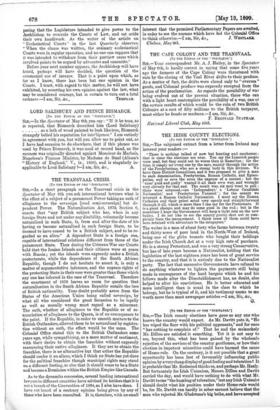THE IRISH COUNTY ELECTIONS. [TO THE EDITOR OF 1/3:13 "$PECTATOR21
Sut,—The subjoined extract from a letter from Ireland may interest your readers :— "There is nothing talked of now but hunting and racehorses ; that is since the elections are over. You say the Limerick people were mad, but they could not be worse than in Ramelton ; for the time, it simply set every one by the ears, mainly through the action of the Presbyterians, who are a strong body in this division. We have three District Councilors, and it was proposed to give a man to each denomination, Presbyterian, Roman Catholic, and Episco- palian, and so save the rates the expense of a contest ; but the undo' paid and godly' wanted it all their own way, and wrought very cleverly for that end. The result was, six men went to poll three were returned,—an Independent,' a Labour Candidate Nationalist,' and Presbyterian Unionist' ; for the county we returned a Roman Catholic Nationalist, I must say the Roman Catholics and their priest acted very openly and straightforward through it all, which is more than I can say for the Protestants. It is a great change, and may do some good in the end ; but in the meantime I hope the Government will keep a tight rein on the new bodies. I do not like to see the county gentry shut out so com- pletely from the management. I think some of them could have been retained with advantage to the ratepayers."
The writer is a man of about forty who farms between twenty and thirty acres of poor land in the North-West of Ireland, being one of the glebe tenants who bought their holdings under the Irish Church Act at a very high rate of purchase. He is a strong Protestant, and was a very strong Conservative, but has of late years become a Nationalist, holding that the legislation of the last eighteen years has been of great service to the country, and that it is entirely due to the Nationalist party. The fact that successive Governments have refused to do anything whatever to lighten the payments still being made in consequence of the hard bargain which he and his fellows made after the Disestablishment has, no doubt, also helped to alter his convictions. He is better educated and more intelligent than is usual in the class to which he belongs, but he is typical of it, and his testimony seems to me worth more than most newspaper articles.—I am, Sir, dm., G.






































 Previous page
Previous page